HI5015 Legal Aspects of International Trade and Enterprise Report
VerifiedAdded on 2022/12/26
|9
|2305
|60
Report
AI Summary
This report examines the legal aspects of multinational corporations (MNCs) operating in Australia, using Samsung as a case study. It begins with an executive summary and introduction to Samsung, a global consumer electronics company. The report then delves into the legislative regulatory framework, including the Corporations Act 2001 (Cth), Fair Work Act 2009 (Cth), Competition and Consumer Act 2010 (Cth), and taxation laws, highlighting their impact on Samsung's operations. Furthermore, the report analyzes the impact of treaties, conventions, and agreements, such as the Australia–United States Free Trade Agreement (AUSFTA), the Convention between Australia and South Korea 1982, the Korea-Australia Free Trade Agreement (KAFTA), and the United Nations Framework Convention on Climate Change (UNFCCC), on Samsung's products and services in Australia. The report concludes by referencing the sources used, providing a comprehensive overview of the legal and regulatory environment affecting MNCs in the Australian market.
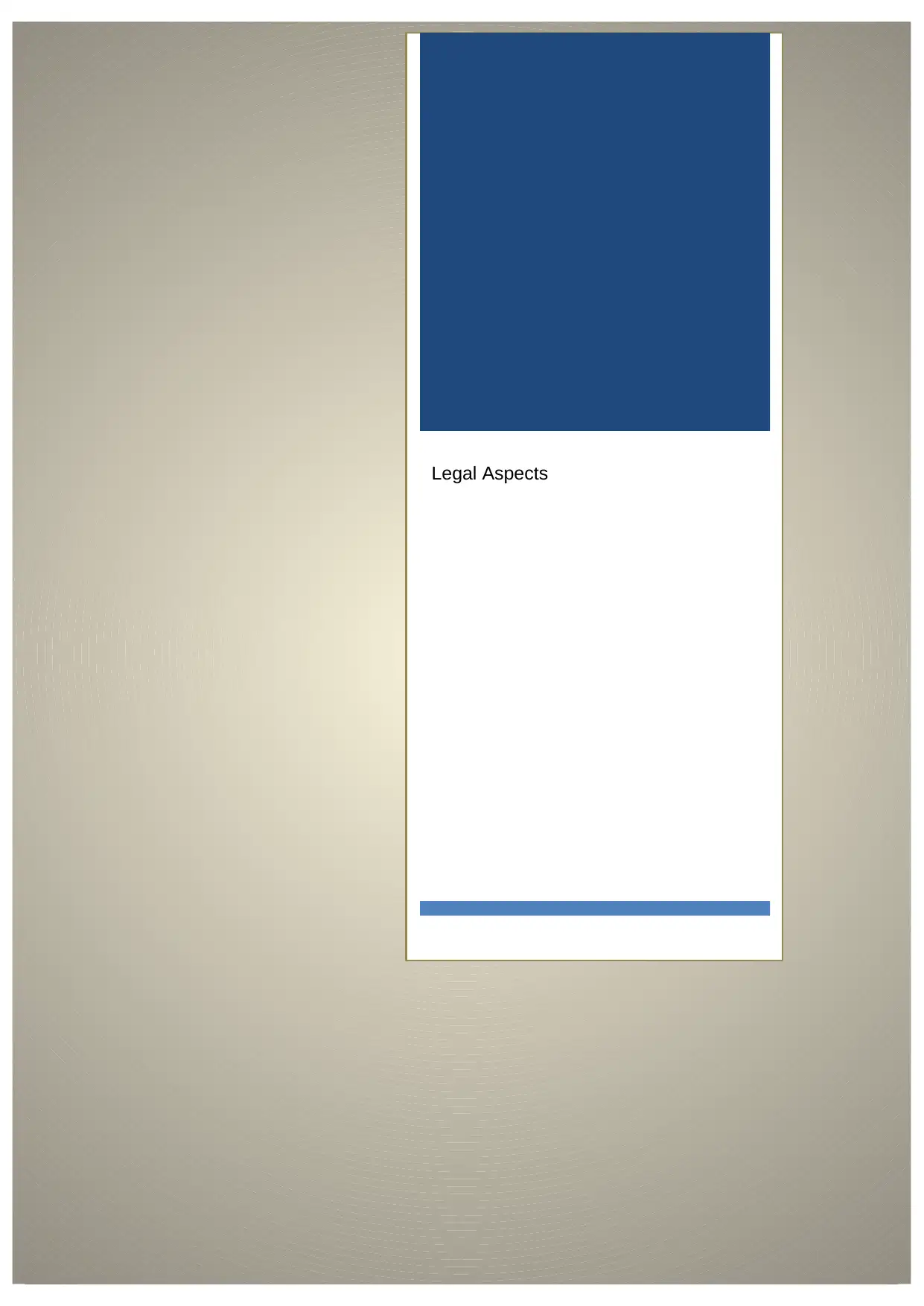
Legal Aspects
Paraphrase This Document
Need a fresh take? Get an instant paraphrase of this document with our AI Paraphraser
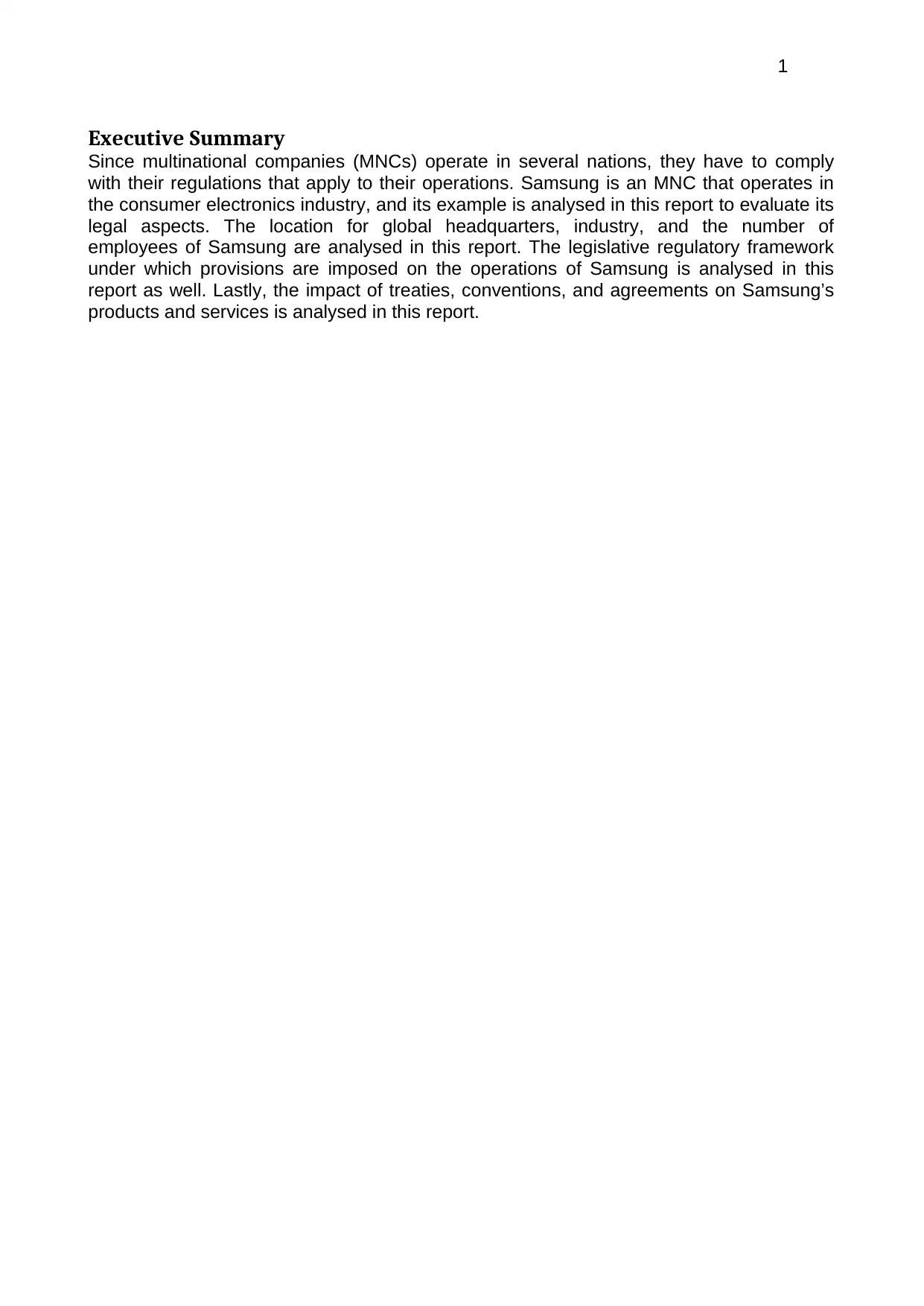
1
Executive Summary
Since multinational companies (MNCs) operate in several nations, they have to comply
with their regulations that apply to their operations. Samsung is an MNC that operates in
the consumer electronics industry, and its example is analysed in this report to evaluate its
legal aspects. The location for global headquarters, industry, and the number of
employees of Samsung are analysed in this report. The legislative regulatory framework
under which provisions are imposed on the operations of Samsung is analysed in this
report as well. Lastly, the impact of treaties, conventions, and agreements on Samsung’s
products and services is analysed in this report.
Executive Summary
Since multinational companies (MNCs) operate in several nations, they have to comply
with their regulations that apply to their operations. Samsung is an MNC that operates in
the consumer electronics industry, and its example is analysed in this report to evaluate its
legal aspects. The location for global headquarters, industry, and the number of
employees of Samsung are analysed in this report. The legislative regulatory framework
under which provisions are imposed on the operations of Samsung is analysed in this
report as well. Lastly, the impact of treaties, conventions, and agreements on Samsung’s
products and services is analysed in this report.
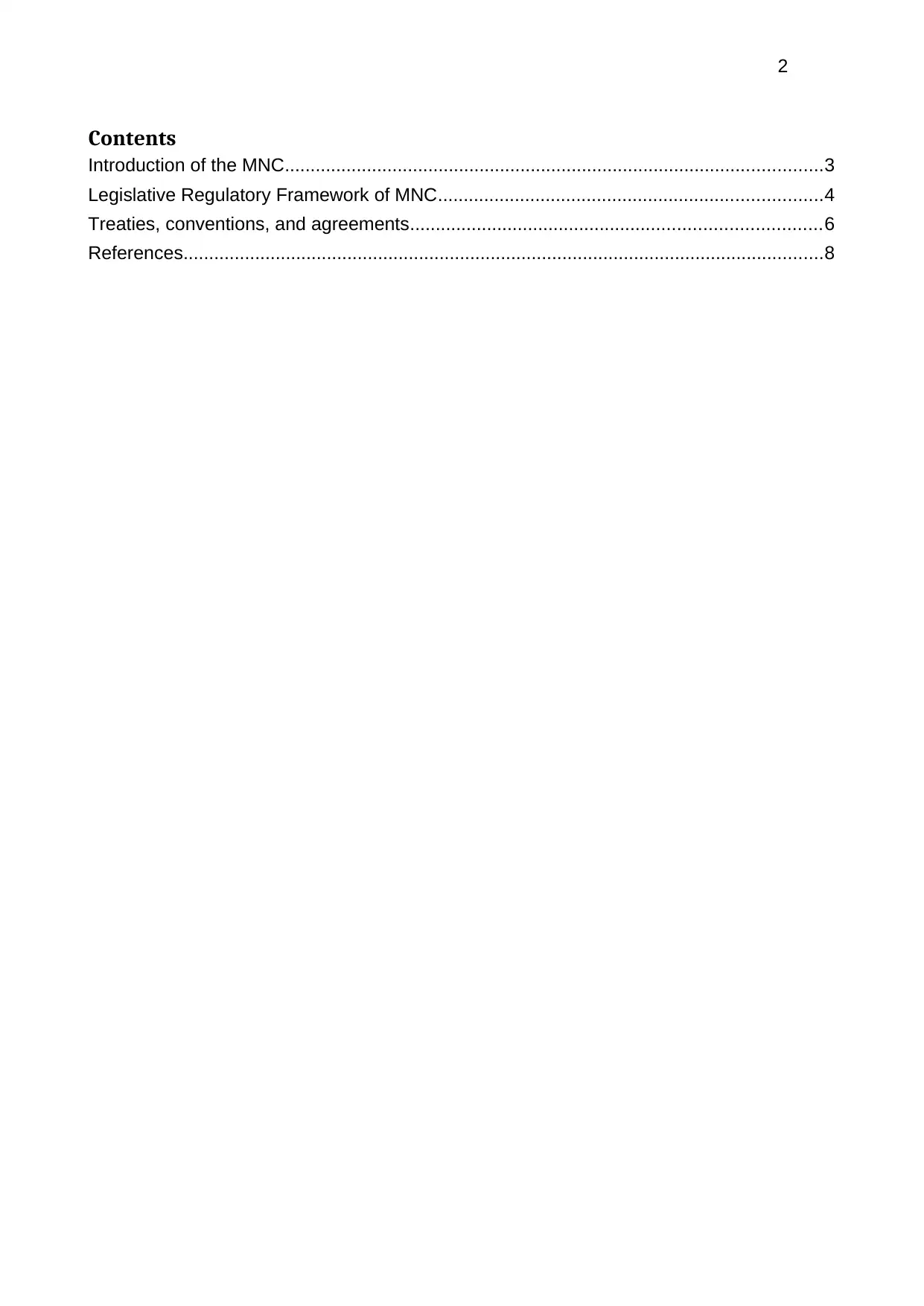
2
Contents
Introduction of the MNC.........................................................................................................3
Legislative Regulatory Framework of MNC...........................................................................4
Treaties, conventions, and agreements................................................................................6
References.............................................................................................................................8
Contents
Introduction of the MNC.........................................................................................................3
Legislative Regulatory Framework of MNC...........................................................................4
Treaties, conventions, and agreements................................................................................6
References.............................................................................................................................8
⊘ This is a preview!⊘
Do you want full access?
Subscribe today to unlock all pages.

Trusted by 1+ million students worldwide
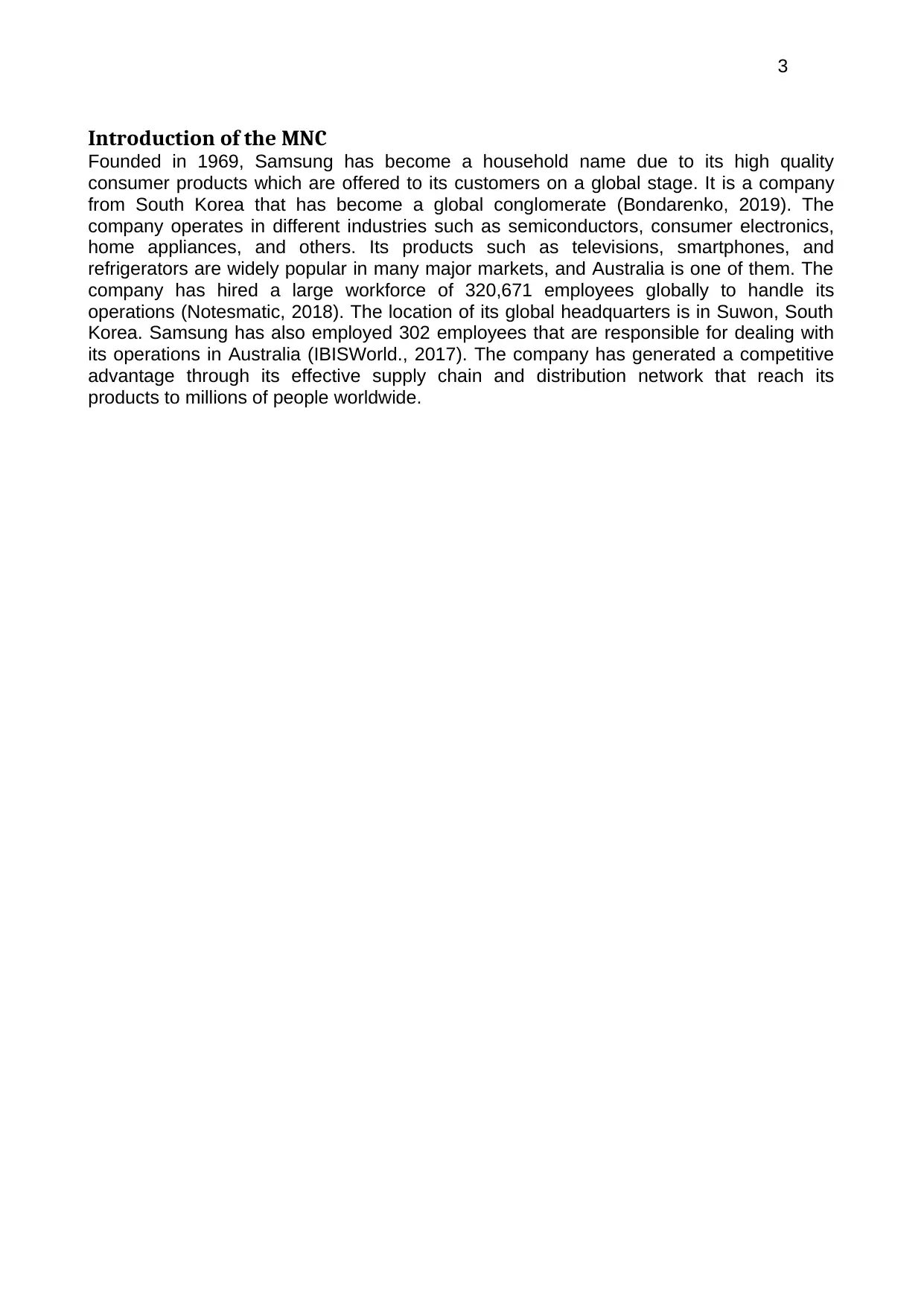
3
Introduction of the MNC
Founded in 1969, Samsung has become a household name due to its high quality
consumer products which are offered to its customers on a global stage. It is a company
from South Korea that has become a global conglomerate (Bondarenko, 2019). The
company operates in different industries such as semiconductors, consumer electronics,
home appliances, and others. Its products such as televisions, smartphones, and
refrigerators are widely popular in many major markets, and Australia is one of them. The
company has hired a large workforce of 320,671 employees globally to handle its
operations (Notesmatic, 2018). The location of its global headquarters is in Suwon, South
Korea. Samsung has also employed 302 employees that are responsible for dealing with
its operations in Australia (IBISWorld., 2017). The company has generated a competitive
advantage through its effective supply chain and distribution network that reach its
products to millions of people worldwide.
Introduction of the MNC
Founded in 1969, Samsung has become a household name due to its high quality
consumer products which are offered to its customers on a global stage. It is a company
from South Korea that has become a global conglomerate (Bondarenko, 2019). The
company operates in different industries such as semiconductors, consumer electronics,
home appliances, and others. Its products such as televisions, smartphones, and
refrigerators are widely popular in many major markets, and Australia is one of them. The
company has hired a large workforce of 320,671 employees globally to handle its
operations (Notesmatic, 2018). The location of its global headquarters is in Suwon, South
Korea. Samsung has also employed 302 employees that are responsible for dealing with
its operations in Australia (IBISWorld., 2017). The company has generated a competitive
advantage through its effective supply chain and distribution network that reach its
products to millions of people worldwide.
Paraphrase This Document
Need a fresh take? Get an instant paraphrase of this document with our AI Paraphraser
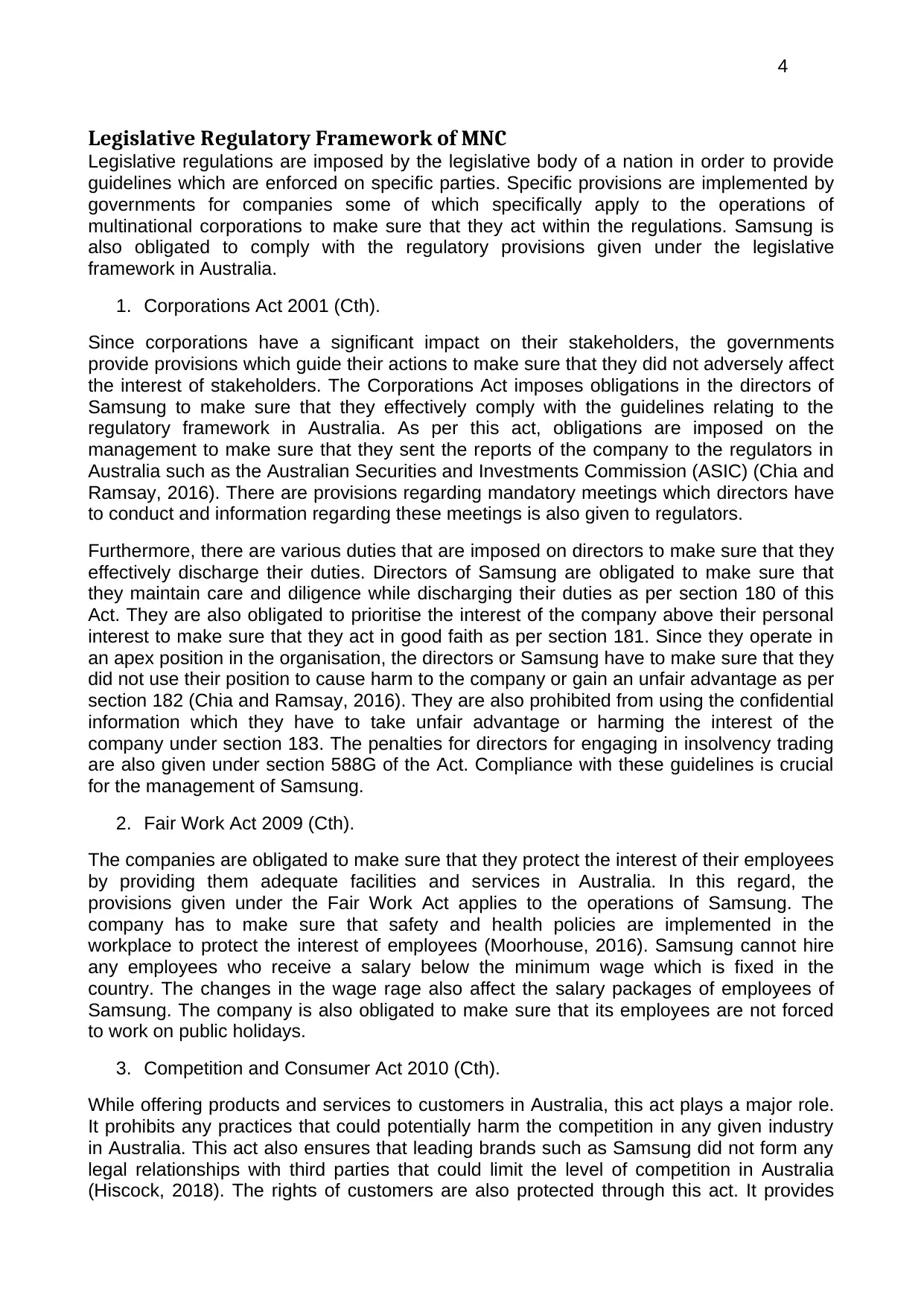
4
Legislative Regulatory Framework of MNC
Legislative regulations are imposed by the legislative body of a nation in order to provide
guidelines which are enforced on specific parties. Specific provisions are implemented by
governments for companies some of which specifically apply to the operations of
multinational corporations to make sure that they act within the regulations. Samsung is
also obligated to comply with the regulatory provisions given under the legislative
framework in Australia.
1. Corporations Act 2001 (Cth).
Since corporations have a significant impact on their stakeholders, the governments
provide provisions which guide their actions to make sure that they did not adversely affect
the interest of stakeholders. The Corporations Act imposes obligations in the directors of
Samsung to make sure that they effectively comply with the guidelines relating to the
regulatory framework in Australia. As per this act, obligations are imposed on the
management to make sure that they sent the reports of the company to the regulators in
Australia such as the Australian Securities and Investments Commission (ASIC) (Chia and
Ramsay, 2016). There are provisions regarding mandatory meetings which directors have
to conduct and information regarding these meetings is also given to regulators.
Furthermore, there are various duties that are imposed on directors to make sure that they
effectively discharge their duties. Directors of Samsung are obligated to make sure that
they maintain care and diligence while discharging their duties as per section 180 of this
Act. They are also obligated to prioritise the interest of the company above their personal
interest to make sure that they act in good faith as per section 181. Since they operate in
an apex position in the organisation, the directors or Samsung have to make sure that they
did not use their position to cause harm to the company or gain an unfair advantage as per
section 182 (Chia and Ramsay, 2016). They are also prohibited from using the confidential
information which they have to take unfair advantage or harming the interest of the
company under section 183. The penalties for directors for engaging in insolvency trading
are also given under section 588G of the Act. Compliance with these guidelines is crucial
for the management of Samsung.
2. Fair Work Act 2009 (Cth).
The companies are obligated to make sure that they protect the interest of their employees
by providing them adequate facilities and services in Australia. In this regard, the
provisions given under the Fair Work Act applies to the operations of Samsung. The
company has to make sure that safety and health policies are implemented in the
workplace to protect the interest of employees (Moorhouse, 2016). Samsung cannot hire
any employees who receive a salary below the minimum wage which is fixed in the
country. The changes in the wage rage also affect the salary packages of employees of
Samsung. The company is also obligated to make sure that its employees are not forced
to work on public holidays.
3. Competition and Consumer Act 2010 (Cth).
While offering products and services to customers in Australia, this act plays a major role.
It prohibits any practices that could potentially harm the competition in any given industry
in Australia. This act also ensures that leading brands such as Samsung did not form any
legal relationships with third parties that could limit the level of competition in Australia
(Hiscock, 2018). The rights of customers are also protected through this act. It provides
Legislative Regulatory Framework of MNC
Legislative regulations are imposed by the legislative body of a nation in order to provide
guidelines which are enforced on specific parties. Specific provisions are implemented by
governments for companies some of which specifically apply to the operations of
multinational corporations to make sure that they act within the regulations. Samsung is
also obligated to comply with the regulatory provisions given under the legislative
framework in Australia.
1. Corporations Act 2001 (Cth).
Since corporations have a significant impact on their stakeholders, the governments
provide provisions which guide their actions to make sure that they did not adversely affect
the interest of stakeholders. The Corporations Act imposes obligations in the directors of
Samsung to make sure that they effectively comply with the guidelines relating to the
regulatory framework in Australia. As per this act, obligations are imposed on the
management to make sure that they sent the reports of the company to the regulators in
Australia such as the Australian Securities and Investments Commission (ASIC) (Chia and
Ramsay, 2016). There are provisions regarding mandatory meetings which directors have
to conduct and information regarding these meetings is also given to regulators.
Furthermore, there are various duties that are imposed on directors to make sure that they
effectively discharge their duties. Directors of Samsung are obligated to make sure that
they maintain care and diligence while discharging their duties as per section 180 of this
Act. They are also obligated to prioritise the interest of the company above their personal
interest to make sure that they act in good faith as per section 181. Since they operate in
an apex position in the organisation, the directors or Samsung have to make sure that they
did not use their position to cause harm to the company or gain an unfair advantage as per
section 182 (Chia and Ramsay, 2016). They are also prohibited from using the confidential
information which they have to take unfair advantage or harming the interest of the
company under section 183. The penalties for directors for engaging in insolvency trading
are also given under section 588G of the Act. Compliance with these guidelines is crucial
for the management of Samsung.
2. Fair Work Act 2009 (Cth).
The companies are obligated to make sure that they protect the interest of their employees
by providing them adequate facilities and services in Australia. In this regard, the
provisions given under the Fair Work Act applies to the operations of Samsung. The
company has to make sure that safety and health policies are implemented in the
workplace to protect the interest of employees (Moorhouse, 2016). Samsung cannot hire
any employees who receive a salary below the minimum wage which is fixed in the
country. The changes in the wage rage also affect the salary packages of employees of
Samsung. The company is also obligated to make sure that its employees are not forced
to work on public holidays.
3. Competition and Consumer Act 2010 (Cth).
While offering products and services to customers in Australia, this act plays a major role.
It prohibits any practices that could potentially harm the competition in any given industry
in Australia. This act also ensures that leading brands such as Samsung did not form any
legal relationships with third parties that could limit the level of competition in Australia
(Hiscock, 2018). The rights of customers are also protected through this act. It provides
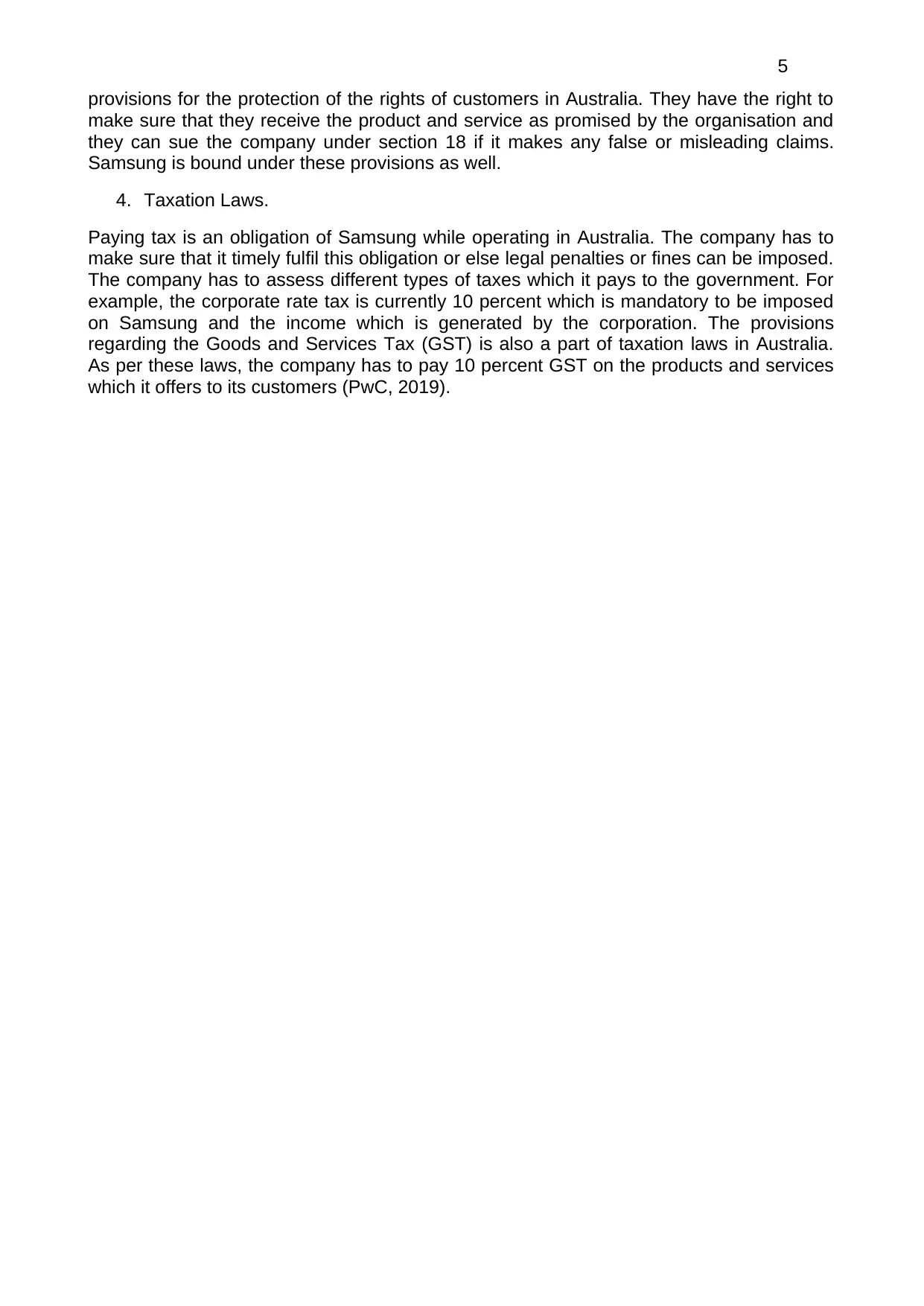
5
provisions for the protection of the rights of customers in Australia. They have the right to
make sure that they receive the product and service as promised by the organisation and
they can sue the company under section 18 if it makes any false or misleading claims.
Samsung is bound under these provisions as well.
4. Taxation Laws.
Paying tax is an obligation of Samsung while operating in Australia. The company has to
make sure that it timely fulfil this obligation or else legal penalties or fines can be imposed.
The company has to assess different types of taxes which it pays to the government. For
example, the corporate rate tax is currently 10 percent which is mandatory to be imposed
on Samsung and the income which is generated by the corporation. The provisions
regarding the Goods and Services Tax (GST) is also a part of taxation laws in Australia.
As per these laws, the company has to pay 10 percent GST on the products and services
which it offers to its customers (PwC, 2019).
provisions for the protection of the rights of customers in Australia. They have the right to
make sure that they receive the product and service as promised by the organisation and
they can sue the company under section 18 if it makes any false or misleading claims.
Samsung is bound under these provisions as well.
4. Taxation Laws.
Paying tax is an obligation of Samsung while operating in Australia. The company has to
make sure that it timely fulfil this obligation or else legal penalties or fines can be imposed.
The company has to assess different types of taxes which it pays to the government. For
example, the corporate rate tax is currently 10 percent which is mandatory to be imposed
on Samsung and the income which is generated by the corporation. The provisions
regarding the Goods and Services Tax (GST) is also a part of taxation laws in Australia.
As per these laws, the company has to pay 10 percent GST on the products and services
which it offers to its customers (PwC, 2019).
⊘ This is a preview!⊘
Do you want full access?
Subscribe today to unlock all pages.

Trusted by 1+ million students worldwide
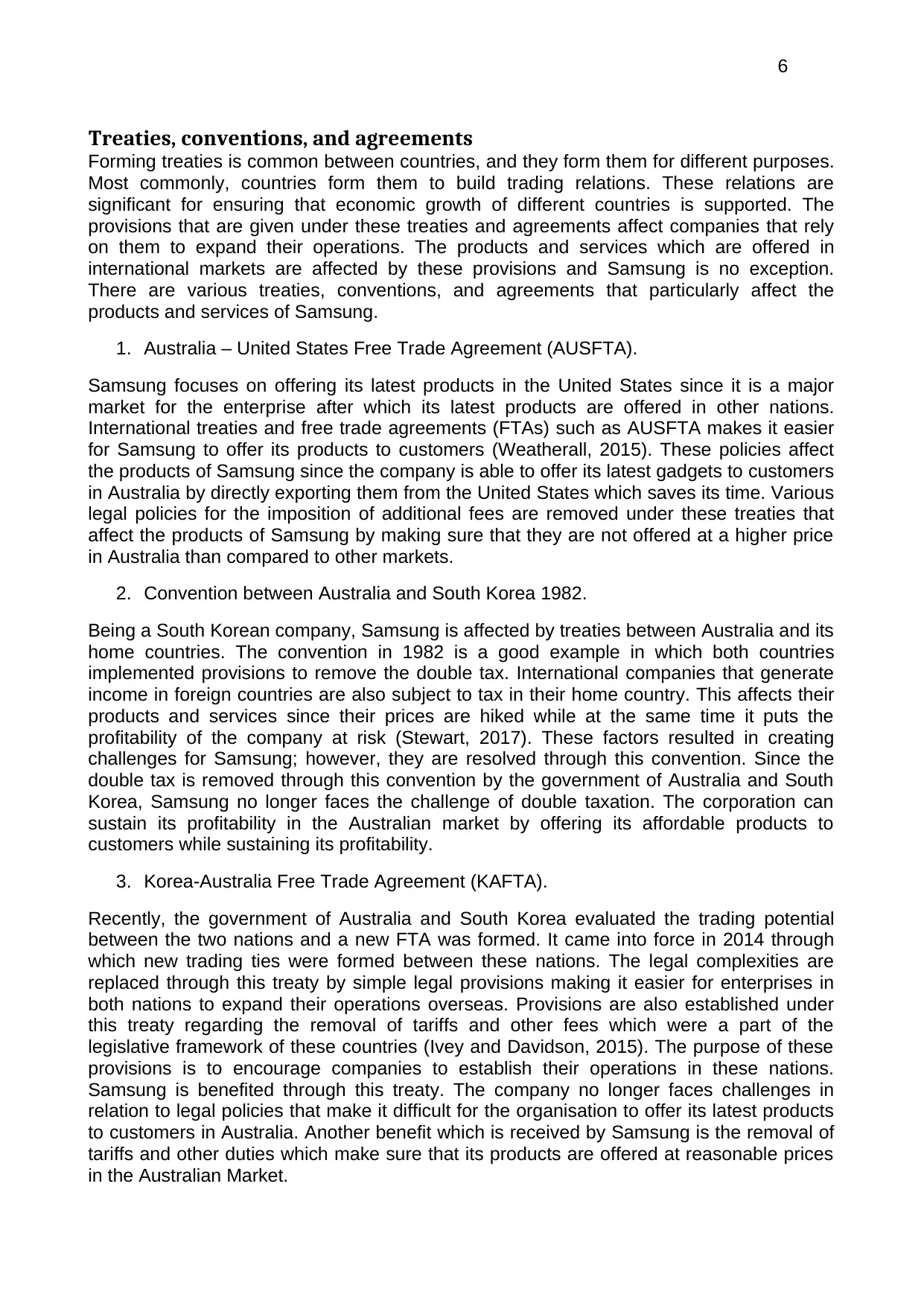
6
Treaties, conventions, and agreements
Forming treaties is common between countries, and they form them for different purposes.
Most commonly, countries form them to build trading relations. These relations are
significant for ensuring that economic growth of different countries is supported. The
provisions that are given under these treaties and agreements affect companies that rely
on them to expand their operations. The products and services which are offered in
international markets are affected by these provisions and Samsung is no exception.
There are various treaties, conventions, and agreements that particularly affect the
products and services of Samsung.
1. Australia – United States Free Trade Agreement (AUSFTA).
Samsung focuses on offering its latest products in the United States since it is a major
market for the enterprise after which its latest products are offered in other nations.
International treaties and free trade agreements (FTAs) such as AUSFTA makes it easier
for Samsung to offer its products to customers (Weatherall, 2015). These policies affect
the products of Samsung since the company is able to offer its latest gadgets to customers
in Australia by directly exporting them from the United States which saves its time. Various
legal policies for the imposition of additional fees are removed under these treaties that
affect the products of Samsung by making sure that they are not offered at a higher price
in Australia than compared to other markets.
2. Convention between Australia and South Korea 1982.
Being a South Korean company, Samsung is affected by treaties between Australia and its
home countries. The convention in 1982 is a good example in which both countries
implemented provisions to remove the double tax. International companies that generate
income in foreign countries are also subject to tax in their home country. This affects their
products and services since their prices are hiked while at the same time it puts the
profitability of the company at risk (Stewart, 2017). These factors resulted in creating
challenges for Samsung; however, they are resolved through this convention. Since the
double tax is removed through this convention by the government of Australia and South
Korea, Samsung no longer faces the challenge of double taxation. The corporation can
sustain its profitability in the Australian market by offering its affordable products to
customers while sustaining its profitability.
3. Korea-Australia Free Trade Agreement (KAFTA).
Recently, the government of Australia and South Korea evaluated the trading potential
between the two nations and a new FTA was formed. It came into force in 2014 through
which new trading ties were formed between these nations. The legal complexities are
replaced through this treaty by simple legal provisions making it easier for enterprises in
both nations to expand their operations overseas. Provisions are also established under
this treaty regarding the removal of tariffs and other fees which were a part of the
legislative framework of these countries (Ivey and Davidson, 2015). The purpose of these
provisions is to encourage companies to establish their operations in these nations.
Samsung is benefited through this treaty. The company no longer faces challenges in
relation to legal policies that make it difficult for the organisation to offer its latest products
to customers in Australia. Another benefit which is received by Samsung is the removal of
tariffs and other duties which make sure that its products are offered at reasonable prices
in the Australian Market.
Treaties, conventions, and agreements
Forming treaties is common between countries, and they form them for different purposes.
Most commonly, countries form them to build trading relations. These relations are
significant for ensuring that economic growth of different countries is supported. The
provisions that are given under these treaties and agreements affect companies that rely
on them to expand their operations. The products and services which are offered in
international markets are affected by these provisions and Samsung is no exception.
There are various treaties, conventions, and agreements that particularly affect the
products and services of Samsung.
1. Australia – United States Free Trade Agreement (AUSFTA).
Samsung focuses on offering its latest products in the United States since it is a major
market for the enterprise after which its latest products are offered in other nations.
International treaties and free trade agreements (FTAs) such as AUSFTA makes it easier
for Samsung to offer its products to customers (Weatherall, 2015). These policies affect
the products of Samsung since the company is able to offer its latest gadgets to customers
in Australia by directly exporting them from the United States which saves its time. Various
legal policies for the imposition of additional fees are removed under these treaties that
affect the products of Samsung by making sure that they are not offered at a higher price
in Australia than compared to other markets.
2. Convention between Australia and South Korea 1982.
Being a South Korean company, Samsung is affected by treaties between Australia and its
home countries. The convention in 1982 is a good example in which both countries
implemented provisions to remove the double tax. International companies that generate
income in foreign countries are also subject to tax in their home country. This affects their
products and services since their prices are hiked while at the same time it puts the
profitability of the company at risk (Stewart, 2017). These factors resulted in creating
challenges for Samsung; however, they are resolved through this convention. Since the
double tax is removed through this convention by the government of Australia and South
Korea, Samsung no longer faces the challenge of double taxation. The corporation can
sustain its profitability in the Australian market by offering its affordable products to
customers while sustaining its profitability.
3. Korea-Australia Free Trade Agreement (KAFTA).
Recently, the government of Australia and South Korea evaluated the trading potential
between the two nations and a new FTA was formed. It came into force in 2014 through
which new trading ties were formed between these nations. The legal complexities are
replaced through this treaty by simple legal provisions making it easier for enterprises in
both nations to expand their operations overseas. Provisions are also established under
this treaty regarding the removal of tariffs and other fees which were a part of the
legislative framework of these countries (Ivey and Davidson, 2015). The purpose of these
provisions is to encourage companies to establish their operations in these nations.
Samsung is benefited through this treaty. The company no longer faces challenges in
relation to legal policies that make it difficult for the organisation to offer its latest products
to customers in Australia. Another benefit which is received by Samsung is the removal of
tariffs and other duties which make sure that its products are offered at reasonable prices
in the Australian Market.
Paraphrase This Document
Need a fresh take? Get an instant paraphrase of this document with our AI Paraphraser
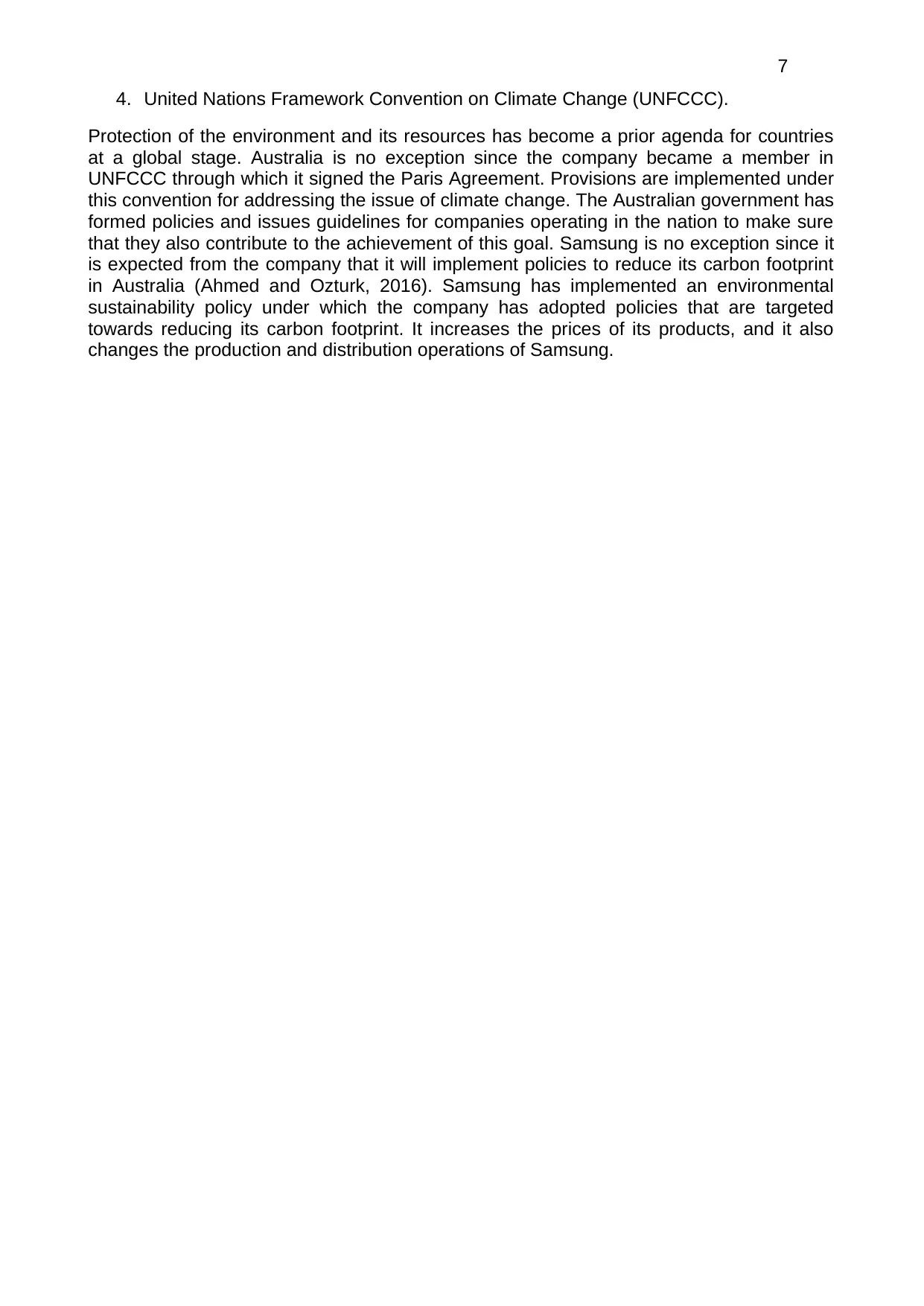
7
4. United Nations Framework Convention on Climate Change (UNFCCC).
Protection of the environment and its resources has become a prior agenda for countries
at a global stage. Australia is no exception since the company became a member in
UNFCCC through which it signed the Paris Agreement. Provisions are implemented under
this convention for addressing the issue of climate change. The Australian government has
formed policies and issues guidelines for companies operating in the nation to make sure
that they also contribute to the achievement of this goal. Samsung is no exception since it
is expected from the company that it will implement policies to reduce its carbon footprint
in Australia (Ahmed and Ozturk, 2016). Samsung has implemented an environmental
sustainability policy under which the company has adopted policies that are targeted
towards reducing its carbon footprint. It increases the prices of its products, and it also
changes the production and distribution operations of Samsung.
4. United Nations Framework Convention on Climate Change (UNFCCC).
Protection of the environment and its resources has become a prior agenda for countries
at a global stage. Australia is no exception since the company became a member in
UNFCCC through which it signed the Paris Agreement. Provisions are implemented under
this convention for addressing the issue of climate change. The Australian government has
formed policies and issues guidelines for companies operating in the nation to make sure
that they also contribute to the achievement of this goal. Samsung is no exception since it
is expected from the company that it will implement policies to reduce its carbon footprint
in Australia (Ahmed and Ozturk, 2016). Samsung has implemented an environmental
sustainability policy under which the company has adopted policies that are targeted
towards reducing its carbon footprint. It increases the prices of its products, and it also
changes the production and distribution operations of Samsung.
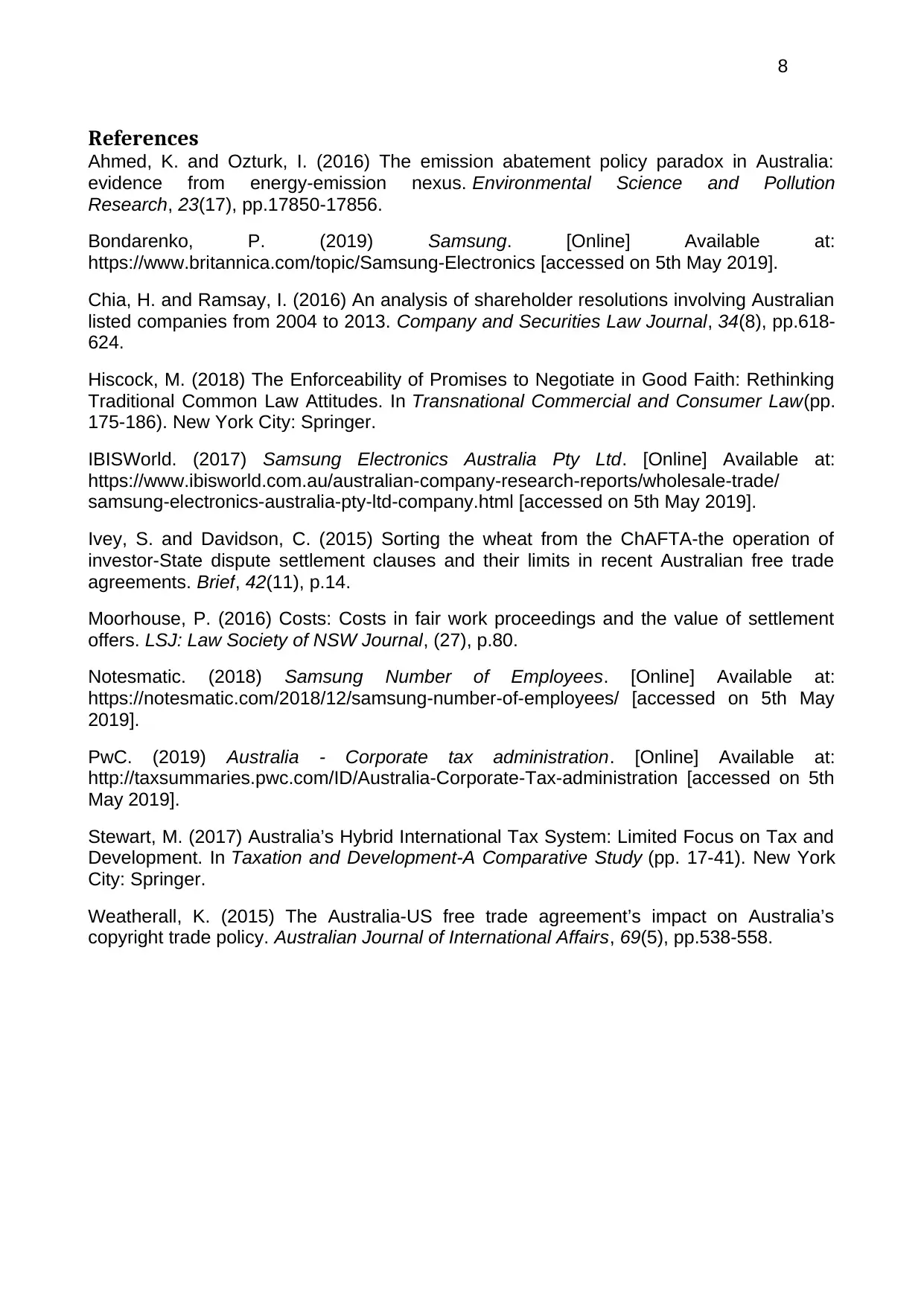
8
References
Ahmed, K. and Ozturk, I. (2016) The emission abatement policy paradox in Australia:
evidence from energy-emission nexus. Environmental Science and Pollution
Research, 23(17), pp.17850-17856.
Bondarenko, P. (2019) Samsung. [Online] Available at:
https://www.britannica.com/topic/Samsung-Electronics [accessed on 5th May 2019].
Chia, H. and Ramsay, I. (2016) An analysis of shareholder resolutions involving Australian
listed companies from 2004 to 2013. Company and Securities Law Journal, 34(8), pp.618-
624.
Hiscock, M. (2018) The Enforceability of Promises to Negotiate in Good Faith: Rethinking
Traditional Common Law Attitudes. In Transnational Commercial and Consumer Law(pp.
175-186). New York City: Springer.
IBISWorld. (2017) Samsung Electronics Australia Pty Ltd. [Online] Available at:
https://www.ibisworld.com.au/australian-company-research-reports/wholesale-trade/
samsung-electronics-australia-pty-ltd-company.html [accessed on 5th May 2019].
Ivey, S. and Davidson, C. (2015) Sorting the wheat from the ChAFTA-the operation of
investor-State dispute settlement clauses and their limits in recent Australian free trade
agreements. Brief, 42(11), p.14.
Moorhouse, P. (2016) Costs: Costs in fair work proceedings and the value of settlement
offers. LSJ: Law Society of NSW Journal, (27), p.80.
Notesmatic. (2018) Samsung Number of Employees. [Online] Available at:
https://notesmatic.com/2018/12/samsung-number-of-employees/ [accessed on 5th May
2019].
PwC. (2019) Australia - Corporate tax administration. [Online] Available at:
http://taxsummaries.pwc.com/ID/Australia-Corporate-Tax-administration [accessed on 5th
May 2019].
Stewart, M. (2017) Australia’s Hybrid International Tax System: Limited Focus on Tax and
Development. In Taxation and Development-A Comparative Study (pp. 17-41). New York
City: Springer.
Weatherall, K. (2015) The Australia-US free trade agreement’s impact on Australia’s
copyright trade policy. Australian Journal of International Affairs, 69(5), pp.538-558.
References
Ahmed, K. and Ozturk, I. (2016) The emission abatement policy paradox in Australia:
evidence from energy-emission nexus. Environmental Science and Pollution
Research, 23(17), pp.17850-17856.
Bondarenko, P. (2019) Samsung. [Online] Available at:
https://www.britannica.com/topic/Samsung-Electronics [accessed on 5th May 2019].
Chia, H. and Ramsay, I. (2016) An analysis of shareholder resolutions involving Australian
listed companies from 2004 to 2013. Company and Securities Law Journal, 34(8), pp.618-
624.
Hiscock, M. (2018) The Enforceability of Promises to Negotiate in Good Faith: Rethinking
Traditional Common Law Attitudes. In Transnational Commercial and Consumer Law(pp.
175-186). New York City: Springer.
IBISWorld. (2017) Samsung Electronics Australia Pty Ltd. [Online] Available at:
https://www.ibisworld.com.au/australian-company-research-reports/wholesale-trade/
samsung-electronics-australia-pty-ltd-company.html [accessed on 5th May 2019].
Ivey, S. and Davidson, C. (2015) Sorting the wheat from the ChAFTA-the operation of
investor-State dispute settlement clauses and their limits in recent Australian free trade
agreements. Brief, 42(11), p.14.
Moorhouse, P. (2016) Costs: Costs in fair work proceedings and the value of settlement
offers. LSJ: Law Society of NSW Journal, (27), p.80.
Notesmatic. (2018) Samsung Number of Employees. [Online] Available at:
https://notesmatic.com/2018/12/samsung-number-of-employees/ [accessed on 5th May
2019].
PwC. (2019) Australia - Corporate tax administration. [Online] Available at:
http://taxsummaries.pwc.com/ID/Australia-Corporate-Tax-administration [accessed on 5th
May 2019].
Stewart, M. (2017) Australia’s Hybrid International Tax System: Limited Focus on Tax and
Development. In Taxation and Development-A Comparative Study (pp. 17-41). New York
City: Springer.
Weatherall, K. (2015) The Australia-US free trade agreement’s impact on Australia’s
copyright trade policy. Australian Journal of International Affairs, 69(5), pp.538-558.
⊘ This is a preview!⊘
Do you want full access?
Subscribe today to unlock all pages.

Trusted by 1+ million students worldwide
1 out of 9
Related Documents
Your All-in-One AI-Powered Toolkit for Academic Success.
+13062052269
info@desklib.com
Available 24*7 on WhatsApp / Email
![[object Object]](/_next/static/media/star-bottom.7253800d.svg)
Unlock your academic potential
Copyright © 2020–2026 A2Z Services. All Rights Reserved. Developed and managed by ZUCOL.





